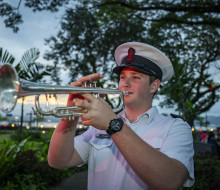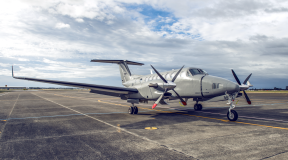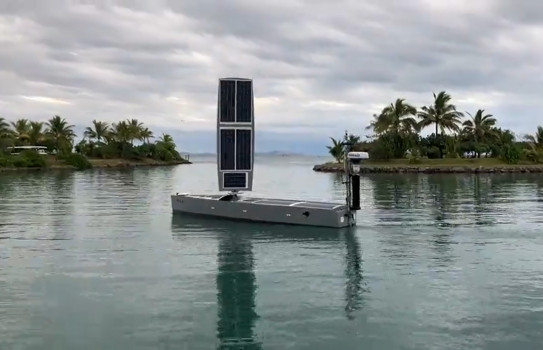
Taupō trumpeter in demand in brand new career with Royal New Zealand Navy Band
26 August 2025
Unfortunately you are viewing this website on an outdated browser which does not support the necessary features for us to provide an adequate experience. Please switch to a modern browser such as latest version of Google Chrome, Mozilla Firefox, Apple Safari or Microsoft Edge.
Ngā mihi nui
Devonport’s Alex Rendle says he’s delighted to be at the forefront of a new chapter in Royal New Zealand Navy history as he works with the Fijian Navy, piloting Uncrewed Surface Vessels (USVs) monitoring suspicious activities.
Warfare Officer Ensign Rendle is one of three personnel from HMNZS Matataua tasked with operating the Bluebottle autonomous maritime technology during a three-month operation.
Ensigns Rendle and Cameron Trotter, and Able Hydrographic Survey Operator Christopher Cornell are working with Fijian Navy personnel at Fiji’s new Maritime Essential Services Centre in Suva to remotely pilot USVs Tahi and Rua within Fiji’s exclusive economic zone. It is the first overseas mission for the USVs.
The two 7.5-metre vessels are being used to identify and track boats and ships operating suspiciously - including those potentially involved in narcotics trafficking.
They are propelled and powered by sun, wind and wave action and can conduct long-endurance operations without requiring refuelling or, as the name suggests, crew.
Earlier in the deployment, a Royal New Zealand Air Force No. 42 Squadron
The King Air 350 (KA350) is a light, twin engine, fixed wing, nine passenger, commuter aircraft. Our Air Force has four KA350s in its fleet, introduced as part of the Air Crew Training Capability project (ACTC). The KA350 has been modified for the NZDF to allow the transport for nine passengers, Air Warfare training and sensor suite training.

The Bluebottle USV on the water in Fiji
Ensign Rendle says the monitoring will run for 24 hours a day, seven days a week, for the duration of the mission, with RNZN personnel at the Devonport Naval Base also sharing operating duties.
The USVs are straightforward to handle, using a hand-held controller when launched for responsive close-in control, and then a mouse and keyboard in an operations room when the USV is in open water.
Operators are often from the warfare trade due to the ship handling and navigation skills taught, he says.
Both he and ENS Trotter graduated from the same officer intake in 2023.
Ensign Rendle said having the Navy “practically on my doorstep” while growing up drew him in.
“My father was a squadron leader with the Royal New Zealand Air Force and I’ve always been interested in Defence.”
He was particularly interested in this “up and coming” autonomous space in the Navy.
“There are a lot of people looking at this. It’s the beginning of a new world for Navy and it’s amazing to be one of the people at the start of the journey.”